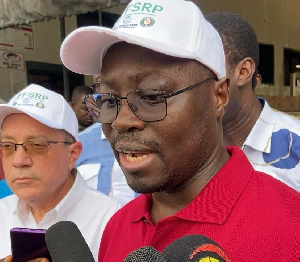By Michael A.K Ellimah -Movement for Social Change and Development
GHANA’S ECONOMIC QUESTIONS – Can Rail Transportation Begin The Answers?
‘If a man will begin with certainties, he shall end in doubts; but if he will be content to begin with doubts, he shall end in certainties.” Francis Bacon There is no doubt that there are more questions than answers in dealing with Ghana’s economic questions. The enormity of these questions does not afford us the luxury to engage in long and empty philosophical debate on where to begin. If we mean sound business to deal with the challenges confronting the mass of our people then not only is it practically expedient to begin from somewhere it is also morally compelling as far as the need for change is concerned. The wind of change is blowing and if it is to blow in a positive light across the entire country then it is imperative to take a second look at the transportation sector of the economy to fashion a more pragmatic and sustainable way forward. In understanding where we are going from here as a nation we must first honestly recognize where we are standing now.
We stand at the most turbulent gates of our development stage with high anxieties of how and where to begin the knocking. The blessings of oil and several natural resources have overwhelmed and taken into captivity the concrete steps we must take to develop our nation. The monotonous use of roads as the means of transportation within the country has not only increased government’s expenditure on road construction but it has also led to the increasing cost of crude oil import bill. It is not wrong to say that the continuous free fall of the Cedi to the US dollar is partly due to the increasing demand of crude oil import bill.
Today our roads have become like graves. Someone have jokingly said that you are more safe to walk in the bullet ridden streets of Sri Lanka than to ride in a vehicle in Ghana. The consequences have resulted in nothing more than road carnages, congestion, unemployment, low productivity, degradation of our environment and many retrogressive results instead of progress that accompanies the blessings of resources. This is the tragic place we unfortunately stand today as a nation. The question therefore is how long must Ghana remain in this quagmire of under development. What is needed is a comprehensive strategy for change, a programme that will bring the poor majority into the mainstream of quality life as quickly as possible beginning from the transportation sector. In doing that the huge benefits associated with rail transport cannot be over emphasized. Rail transport presents to us the huge advantages of increased productivity in almost all sectors of the economy. Over the years the need to increase productivity has dominated labour and economic discussions. Among several factors identified to be inhibiting productivity were lateness at work, improper transport system, loss of man hours spent in traffic, stress and other poor transportation related system. There is nothing like traffic jam and congestion with rail transportation and thereby the needless hours spent in traffic would be effectively checked leading to productivity. A nation such as ours presiding over abundant resources can not afford to wallow in the tortuous corridors of poverty arising from low productivity.
Earlier this year, the blood of innocent passengers flowed through most of our roads still flows as the day passes. The road carnage Ghana has experienced over the last few years has been a major hindrance to the progress of the economy and calls for immediate action in reversing the trend. The various causes of these accidents have been attributed to a range of wrongful over-taking, over speeding, carelessness, poor state of our roads and many avoidable traps that leads to accidents. To effectively deal with this canker killing the economy on an installment plan is the dire need to focus attention on expanding and revamping the rail network system. Until attention is concentrated on rail transportation we are chasing after the wind in our efforts in arresting the damaging elements militating against the economy. A reduction in accidents would translate into a reduction in the unnecessary pressure on our health facilities particularly the emergency centers. The different kinds of unworthy vehicles plying and creating congestion on our roads and consequently causing needless accidents would be minimized to save the human resource base needed to drive the economy to the desired paradise all of us and future generations want to experience.
While the economy would be enjoying massive expansion through rail transportation, the generation of employment would incontrovertible be the fruits such economic expansion. Easy transportation of goods and services from the production sources to the consumer markets would receive a considerable boost. Most at times food produced in many parts of the country perish in the farms for lack of effective means of transportation. The rising cost of food stuffs in our markets can be attributed to the limited supply to of food stuffs to the market centers at the expense of the chunk that decay in the farms. The question of rising cost of living can to some extent be answered by having to prioritize the issue of rail transportation in the country. The transportation of goods such us cocoa beans, petroleum products, cement and many other cargo that requires large carriage for its conveyance could easily be transported in very large quantities by means of cargo trains. The already stresses that our roads is currently enduring is likely to be compounded with the exploitation of the emerging oil industry in the country. Not only will a reduction in the number of cargo vehicles on our roads reduce the spate of road carnage but also the life expectancy of our roads would fairly see longevity which would inure in a reduction of the huge sums of funds spent on maintaining the roads. The funds needed for the needless maintenance of our roads can be applied in expanding our health facilities, provision of quality education and several aspects of the economy that are begging for prompt attention.
In the developed world proximity to work places is not much of a headache to workers due to effective rail transportation system. Rail transport is very safe, reliable and very cheap. The city of London is connected by a powerful rail network system. We cannot do this over night. What is important is that we must take a bold decision now and start making progress.
Our cities are today congested with its attendant sanitation challenges due to the demands to drawing closer to work places. One would not have to be exploited by landlords and landladies in the business centers in securing accommodation so they could commute to work with ease. Commuting from Winneba and Accra, Takoradi and Capecoast or Tamale and Kumasi or Accra in getting to our work places can be made possible by effective rail transport and therefore the difficulties associated with moving one’s whole family from one town to the business centers will greatly be minimized. Again, pollution of the environment from fumes of the many vehicles that ply our roads would reduce upon a reduction in the number vehicles on our roads.
It is unarguably true from the foregoing that rail transportation would open the flood gates of opportunities to pulling down the strongholds and principalities standing in the way of a prosperous economy and a sustainable development. Without recognizing this we will end up with solutions that do not solve, answers that do not answer and explanations that do not explain. We can begin to answer the economic questions from the transport sector. This is the change Ghanaians have long been awaiting. A change that truly change.
The writer is the Leader and Spokesperson for
Movement of Social Change and Development-MOSCAD
Email: michaelkwamek@yahoo.com
Opinions of Saturday, 30 May 2009
Columnist: Ellimah, Michael A. K.














